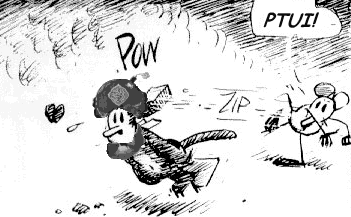 BERLIN The prime suspects in the failed attempt to blow up two German trains were partially motivated by anger over the publication of cartoons of the Prophet Muhammad, a leading investigator said in an interview released Saturday. BERLIN The prime suspects in the failed attempt to blow up two German trains were partially motivated by anger over the publication of cartoons of the Prophet Muhammad, a leading investigator said in an interview released Saturday.
The Danish newspaper Jyllands-Posten first published the 12 cartoons in September 2005. One of the pictures showed Muhammad wearing a turban shaped like a bomb.
Some of the caricatures were republished in German newspapers and other European media months later, sparking protests across the Muslim world, with rioters torching Danish and other Western embassies.
Train bombing suspect Jihad Hamad, 20, told interrogators in Lebanon that fellow Lebanese student Youssef Mohamad el Hajdib, 21, "interpreted it as an attack of the Western world on Islam," said Joerg Ziercke, head of Germany's Federal Crime Office, or BKA.
El Hajdib was arrested Aug. 19 in the northern German city of Kiel, and Hamad was picked up a few days later in Lebanon.
The men are suspected of planting crude bombs July 31 on two trains at Cologne station, where they were seen in grainy surveillance camera video pulling wheeled suitcases.
The bombs were found later in the day on regional trains in Koblenz and Dortmund. Authorities have said that the detonators went off but failed to ignite the devices.
Ziercke told Focus magazine that further motivation for the suspects came with the death of al-Qaida in Iraq leader Abu Musab al-Zarqawi, killed June 7 in a U.S. airstrike north of Baghdad.
"Both of the prime suspects believed that international terrorism had lost its most important leader," Ziercke said in an interview released to The Associated Press ahead of publication. "The conflict in Lebanon also played a role (in motivating them) though we know the planning for the attacks had already begun earlier than that."
The BKA confirmed the content of the interview.
In addition to Hamad, Lebanese authorities have arrested three other men in connection with the case: Ayman Hawa, Khaled Khair-Eddin el-Hajdib, Khalil al-Boubou. They were rounded up by police acting on information from Interpol.
German officials have also taken a 23-year-old Syrian, Fadi al-Saleh, into custody in the southern city of Konstanz on suspicion he did Internet research in preparing the bombings.
Lebanese prosecutor Pierre Francis on Saturday charged all six suspects in the case, a development that appeared to signal that Beirut would refuse to extradite to Germany the four men held in Lebanon.
The charges came as a security team headed by German intelligence chief Ernst Uhrlau, was in Beirut meeting with Lebanese army intelligence and security chiefs. Uhrlau arrived under tight security Friday in what Lebanese newspapers said was a mission to seek the extradition of the men.
Ziercke said he did not believe Hamad and el-Hajdib came to Germany with the intent to prepare attacks.
"The radicalization first took place here, through al-Qaida propaganda found on the Internet," he said.
The bomb plans were also found on the Internet, and the devices would have cost a total of about 200 (US$250) to 300 (US$385) to build, he said.
"We found instructions that account for about 90 percent of their bombs," he said. "They diverged from the plans only in a couple points and it was here that the technical mistakes were made."
But Ziercke rejected suggestions that the sloppy construction of the bombs and other clues DNA, fingerprints and the use of their own passports in travel meant they were untrained amateurs.
"To the contrary: They had counted on their plan working," he said. "Then the crucial clues would have been obliterated. We, for example, would never have found any suitcases that we could match to people seen on video surveillance." |
 BEIRUT, Lebanon (AP) - A Lebanese man on trial for a failed train bombing in Germany last year testified Thursday that he and another suspect planted crude bombs to protest cartoons that ridiculed Islam's prophet Muhammad, but he denied any links to al-Qaida. Reports of the trial, carried by the state-run National News Agency, said Jihad Hamad told the court he and fellow suspect Youssef el-Hajdib, who is under arrest in Germany, bought gas canisters, fitted them with detonators, tested them and planted them on the trains.
BEIRUT, Lebanon (AP) - A Lebanese man on trial for a failed train bombing in Germany last year testified Thursday that he and another suspect planted crude bombs to protest cartoons that ridiculed Islam's prophet Muhammad, but he denied any links to al-Qaida. Reports of the trial, carried by the state-run National News Agency, said Jihad Hamad told the court he and fellow suspect Youssef el-Hajdib, who is under arrest in Germany, bought gas canisters, fitted them with detonators, tested them and planted them on the trains.
 BERLIN The prime suspects in the failed attempt to blow up two German trains were partially motivated by anger over the publication of cartoons of the Prophet Muhammad, a leading investigator said in an interview released Saturday.
BERLIN The prime suspects in the failed attempt to blow up two German trains were partially motivated by anger over the publication of cartoons of the Prophet Muhammad, a leading investigator said in an interview released Saturday.